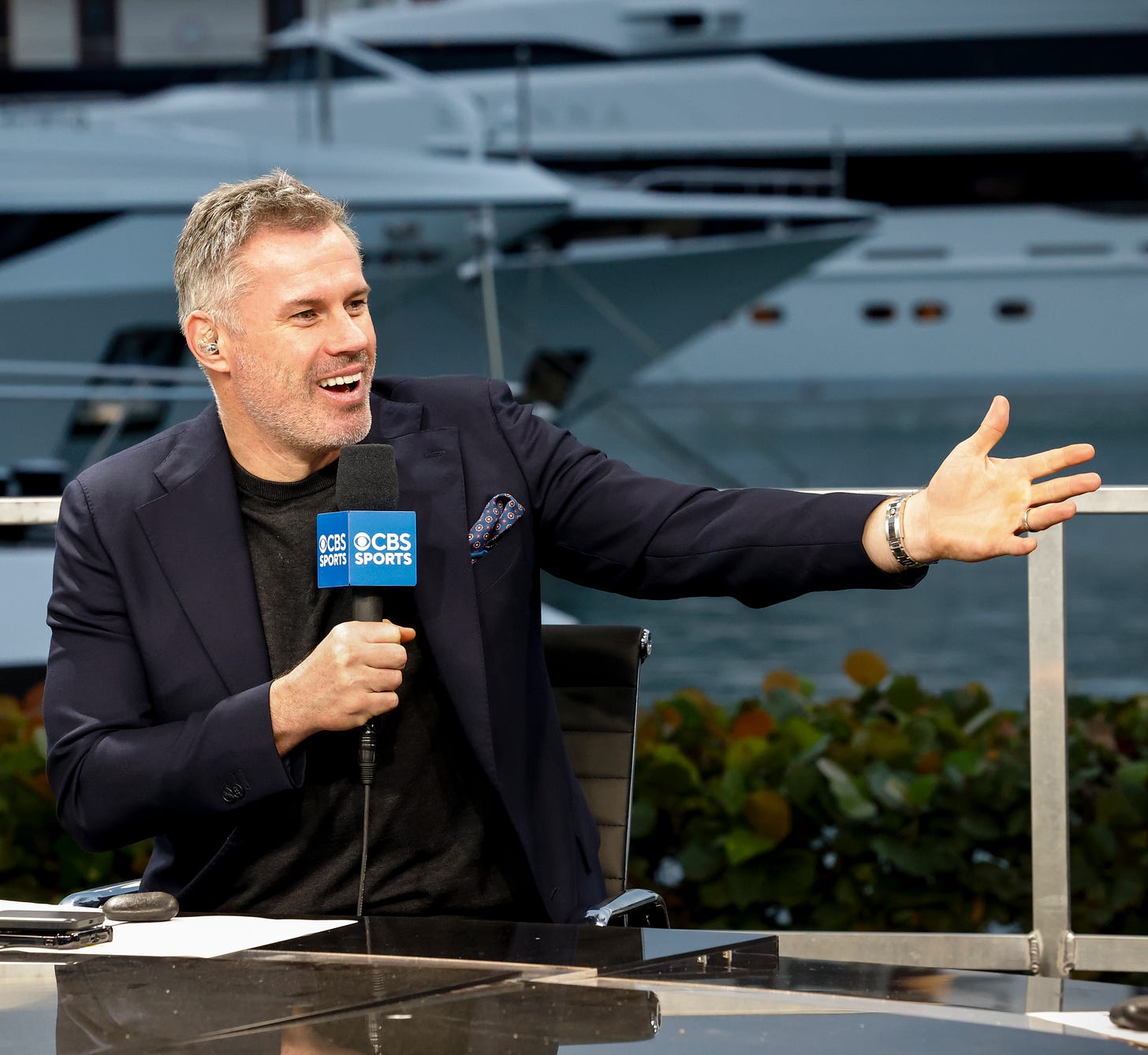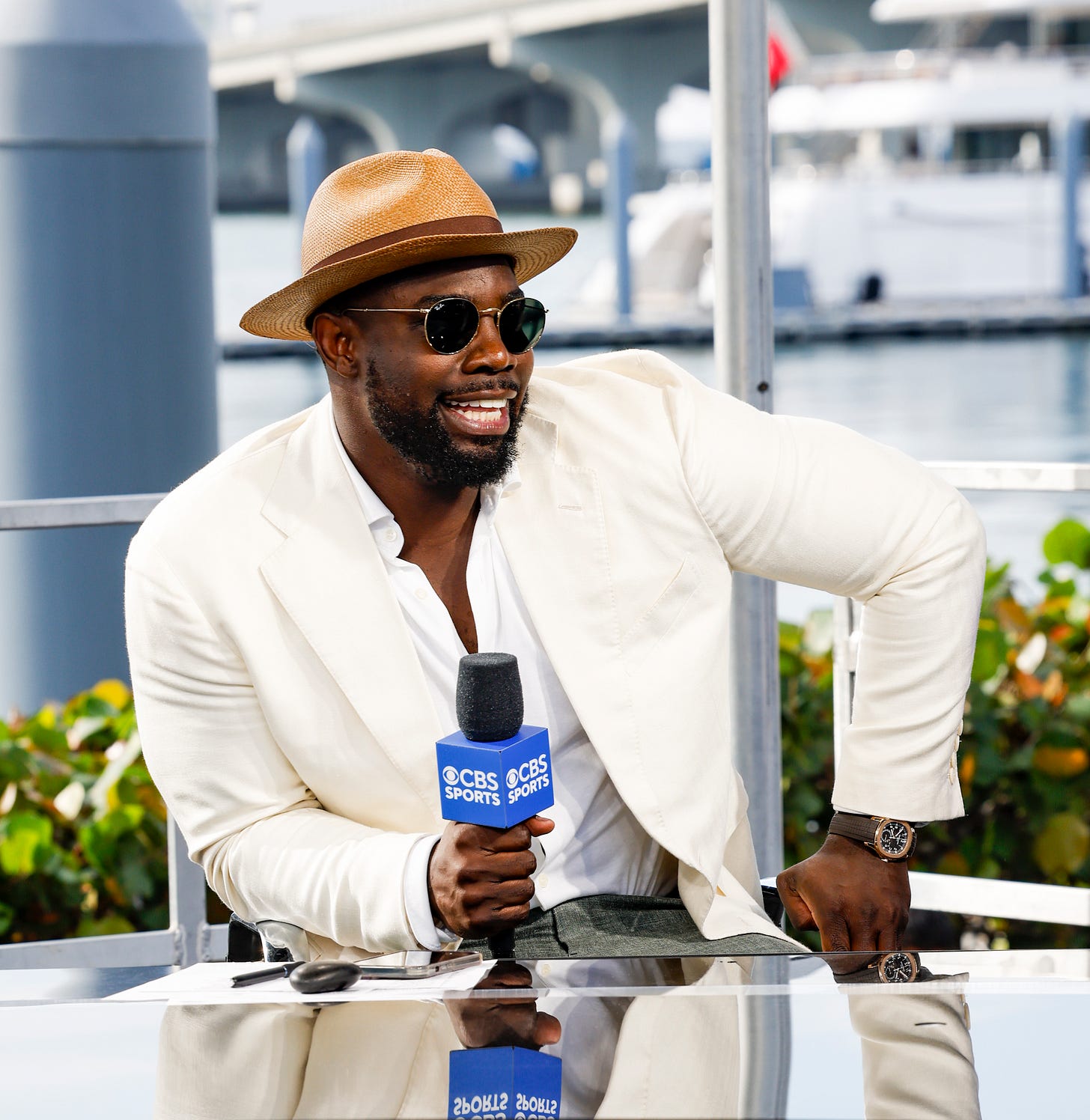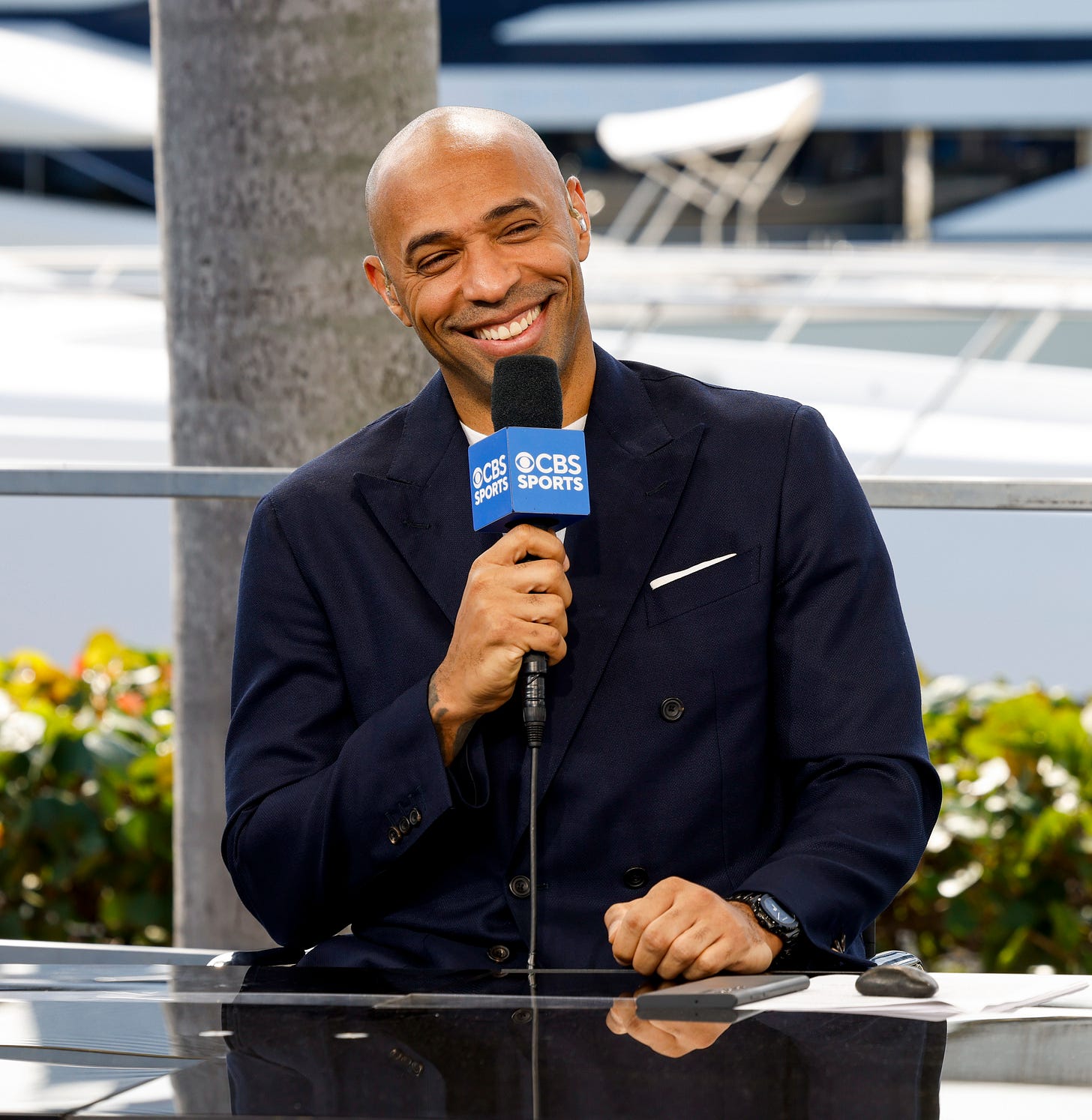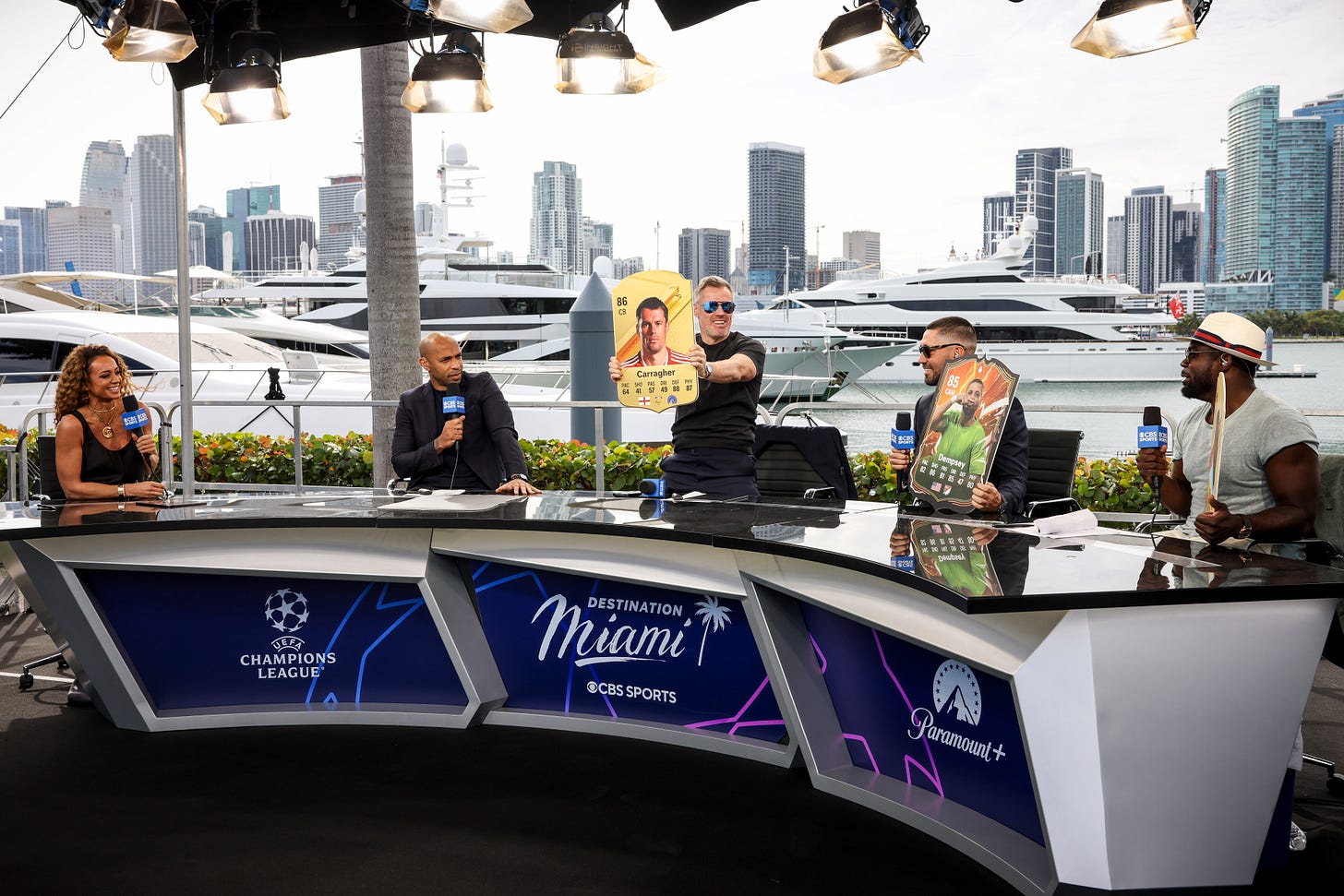How Thierry Henry, Jamie Carragher, and Micah Richards Got on American TV
Interviews with the three stars reveal the inside story of how they got involved in a project that took shape over just 28 days.
28 DAYS ‘TIL LISBON
CBS Sports chairman Sean McManus was visiting the Inside the NFL production team one day when he subtly broke some news. “In passing, he said to me, ‘We’re in the mix for the Champions League,’” remembers Pete Radovich, senior creative director for the network. “I said, ‘Don’t f- with me, Sean. For real?’”
TNT had the rights to broadcast the Champions League in the United States in 2020 but exited their contract early, citing the pandemic. So CBS took over a year earlier than planned, when Europe’s highest-level football competition resumed in a special format in Lisbon, Portugal at the end of the summer. The way things shook out, the production team had 28 days to put a show together.
Things were closed up Stateside, but Radovich says he made some calls and found out they could do a studio show in London. That meant recruiting from the pool of local talent.
“We were meeting some of the greats of the sport on Zoom, day after day,” says Radovich, senior creative director at CBS Sports. “I had to go to London quickly, because I needed to quarantine for two weeks in a hotel room.” They soon settled on a strategy of recruiting talent that worked weekends covering the Premier League but had an opening on Tuesdays and Wednesdays to do American TV.
“We were getting deals done in, like, three days,” he says. “Usually, it takes three weeks, three months.” The first recruit was host Kate Abdo, and you can get the full story on that in GQ this week.
But how did the rest of the crew come together?
JAMIE CARRAGHER: TONE DOWN THE SCOUSE!
“The only debate was whether or not the American public could understand him,” Radovich said of Jamie Carragher, the local lad who wore the red shirt of Liverpool for a decade and a half before he became a broadcaster. “So, the first question on Zoom was, “Can you dial back your Scouse?”
Carragher laughed and said he’d already done Danish TV (in English), where he’d had to dial his accent back. It wouldn’t be a problem. But Radovich and the two executives on the call, Jeff Gerttula and Ben Stauber, still weren’t quite convinced.
“I said, I'm going to find a clip of him,” Radovich remembers. “We'll show it to our wives tonight, and we'll ask our three wives, ‘Do you understand this man?’ And he won on a vote of 2 to 1.”
Thus did one of Britain’s foremost football pundits secure a job on American TV.
“What Sky gives me and what CBS give me are almost completely different ends of the spectrum in terms of punditry,” Jamie Carragher said from an armchair in a makeshift living room under a tent. It was the green room for a special live broadcast of Champions League Today from Watson Island in Miami, Florida. A chunk of the city skyline served as the background of the set, while off to the right was backstage. “I love honing in on small details, analytical stuff that you get with Sky,” he added. “With CBS, it's more off-the-cuff, probably not as rehearsed. We just go with the flow, because we've got a relationship with each other. We can just bounce off each other.”
Carragher’s role alongside Gary Neville on Sky’s Monday Night Football has been massive in the football mediascape for years, but he says this gig with CBS has changed things for him. They still talk tactics here, but he gets to goof off a bit and mostly get a break from the highly serious debates.
“I don’t think you could do this show in England,” he says. “The rivalries between football supporters are so tribal. It’s probably less so in America. And it’s the Champions League—not everybody’s team is involved. So we can be a little bit more lighthearted. But people actually see me with a smile on my face now.”
Radovich says Carragher is well aware of how he got the job, and whom he has to thank for this additional paycheck. “We joke about that all the time,” the producer adds. “He says that when he meets the wives—the two wives—he's going to buy them dinner.”
MICAH RICHARDS “WAS A QUICK NO”
“I mean, Miami, this is all me, baby,” Micah Richards said when I suggested Destination Miami was the kind of event he’d plan. He had on a straw panama hat and a cream blazer over a white shirt buttoned liberally, sitting on a couch in the tented living room next to Kate Abdo and Thierry Henry. Behind us, Clint Dempsey and Charlie Davies were tossing a football around that would eventually be a prop for a bit between Richards and Tyreek Hill of the Miami Dolphins.
“I wouldn’t rather work with anyone else,” Richards says of his couchmates, prompting an, “Aww,” from Abdo. After a beat, Richards added: “—apart from my people at Sky, the BBC, A League of Their Own, [some] podcasts…”
When the CBS team was putting the show together over those manic 28 days, looking for talent, they came across Micah Richards’s tape. It was clips of his early television career on the BBC. “He fit the bill, because he was a defensive player who’d just retired, had a good name, hadn't been really overexposed to television,” Radovich says. “So we're taking a look. And it was just so, frankly, boring.”
It’s not something you’d expect to hear about Richards, the volcano of personality on-set. “He was just very robotic and very predictable,” Radovich continues, “buttoned up and not confident and not there yet. It was a quick no, and that was that.”
But it all changed just a few days later, when Radovich went deeper into the research and realized it was where Richards was, not who he was. “I stumbled on a podcast. I think it was Peter Crouch's podcast, and Micah was a guest. And I was just—jaw dropped. [He was] telling Mario Balotelli stories, cracking up, laughing, the whole thing. It was like a different person.
“So I called Ben back and was like, ‘Remember Micah Richards? We want to talk to him.”
And when they got on Zoom shortly thereafter, Radovich cut right to the chase: “I've seen you on the BBC. I've seen you on podcasts. We want the podcast Micah Richards. Can you do that on TV?
“And it was typical Micah,” Radovich says, popping into Richards’s boisterous, gleeful northern British delivery. “‘Pete, of course! They won’t let me do that on TV.’ And I’m like, ‘Well, we will.’ And that was it. If I don’t see that podcast clip of Micah, there’s no chance he’s here today.”
“Broadcasting has given me a new lease on life, it really has,” Richards says. He enjoyed a meteoric rise to his footballing career, the youngest defender to be capped for England at just 19. “I couldn't really go out in Manchester,” he says, remembering the crowds, but “it nosedived so quickly.” When his career was cut short at 31 because his knees wouldn’t allow him to play at his level, he just wanted to get away from the game. “I was lost in what I wanted to do. I really was lost.”
Now he’s found, with thick skin from the journey. “I've won the Premier League, I won the FA Cup, but I've also been relegated. I've also been shouted abuse at by fans—that I'm not good enough.” He can take a few jokes from Abdo and Carragher, in other words, and provide the laugh track with his booming chuckle.
“You can’t replace somebody like that,” Radovich says. “If he hears me say that now, I’m in trouble. He's going to ask for a long-term contract. [But] he's just such a human talent.”
THIERRY HENRY: SOME PEOPLE KNOW ME AS THE GUY FROM THAT SHOW!
“For me, I think it’s the best show I’ve been on by some distance,” Thierry Henry says from the couch next to Richards and Abdo, occasionally shifting forward to make a point. His double-breasted blazer tops a white turtleneck. “They give us the floor within the structure of what we need to do. We can be ourselves. There is a difference between fitting in—which is what I thought I was doing in some of the shows that I did before—and here I belong.”
“He’s like a poet, innt’he?” Richards says.
“Fitting in—you do what people want you to do in order to be where you are,” Henry continues. “We have rules, but to be able to express yourself on TV, it’s valuable. There is great energy. We can laugh, we can talk about war, we can talk about anything. At times it’s a bit edgy, also. That’s how a family is.”
Henry’s chair on the panel was initially occupied by Roberto Martinez, who left in 2021. When Abdo ran into Henry at an event and he told her he liked the show, it was a quick phone call and another deal swiftly signed. Now he’s in the crew.
“We’ve got a license from Pete over there to do what we want,” Richards adds, gesturing across the tent.
“Not to wear that hat,” Radovich replied.
Richards asks how the show is perceived by Americans. Like everybody else in the U.K., he and Carragher and Henry only see the CBS Sports Golazo social programming, where game tape is geo-blocked to respect local broadcast rights.
“You guys might see a great [tactics] piece that Thierry’s done, but it's not really going out in the U.K. as well,” Richards says. “So a lot of people come to us and say, ‘Oh, you lot just laugh and joke.’ Which we do, but we can do more than that as well.”
For tactical insights, they’ve started to do more physical demonstrations around the studio set—including in Miami, where Henry showed how to post up a defender with Richards playing the part.
“It’s different for me, because I see the game as a coach,” says Henry, who manages the French U-21s. “If you're the coach for Under-21s, you don't have scouts to watch games for you,” he says, so he watches nine or 10 matches every week to keep up with all his young national-teamers. And then there’s his prep for TV work. It’s a lot of football to keep track of, including the many simultaneous matches they all have to digest on Champions League nights.
But the core of the show is the interchange between the wildly different personalities on set. Later, I asked Richards what position each of the crew would play, offering that Abdo might be the Xavi, keeping the whole team ticking. His response served up quite the role reversal. “Thierry is the center half, the captain, leading by example,” he said. “Jamie’s midfield—attacking midfield, but he can do both.” And Richards, in his own estimation, is the striker: “I’m the one where people are waiting for me to do something—to do an overhead kick.”
“Knowing what we had in our group, personality-wise, the last thing I was going to do was tell them, you have 15 seconds, you have 15 seconds, and stay on script,” Radovich says. “We could have done that, and that's very safe. By and large, sports studio shows are very safe. There's no fun in that. I get bored very easily. So I wanted us to be authentic, I wanted us to be natural. I wanted us to just have a voice.
“As predictable and structured as American sports television can be, English sports television is even worse. So those guys, coming out of that system into one where if you want to say something, say it,” Radovich says, “They felt like it was just a blessing for them. It was a get-out-of-jail moment for them. Jamie Carragher—you tell a guy from Liverpool that's got a wicked personality and a wicked sense of humor that he can be himself? Be careful what you wish for sometimes, but they really embraced it.”
“We didn't have a bunch of time to sit down and rehearse,” Abdo says, “So it all became very organic, very quickly.” Richards adds that they started this show from scratch, so it was never a question of fitting into a mold. They spend a lot of time together, so “you know what boundaries you can push and what you can get away with,” Carragher says. “Things that you say to each other. I know there’s things I can say to Micah that I can’t say to Thierry. I don't think there's many boundaries with me, Micah or Kate. I think with Thierry, maybe a little bit more, because he’s Thierry Henry.”
And balance is important, too. “Tonight, if Manchester United get knocked out, that's something that is to be looked at seriously,” Carragher says. “Me and Micah’ll probably laugh, because he’s Man City and I’m Liverpool. But in terms of analyzing it, I think that’s a time for serious chat.”
“It’s exactly like how you’d be in a room at home,” Henry says, “except without the swearing.”
At one point, it’s cacophony in the tent, as the social team shoots a video where members of staff try to match a piece of juggling skill Henry demonstrated. It would yield a post with 8.7 million views. It’s a reminder of how transformational this show has been for everybody involved.
“They call me Big Meeks now!” Richards booms when I ask what that’s meant for him. “I wasn’t Big Meeks two or three years ago. CBS has changed my life, man. I’m not gonna lie.”
That even goes for Thierry Henry, who scored 229 goals at the top level of club football across England, Spain, Italy, and France and won the World Cup in 1998.
“My career wasn’t shite, but I get as many compliments now [for this show] than for what I did on the field,” he says. “Sometimes people come up and say, ‘Thierry, can I take a picture?’ And I’m like, ‘Yeah,’ expecting, ‘I love Arsenal, Barcelona, the national team.’ And it’s, ‘Oh, I love your show on CBS.’”⚽︎
Support feature storytelling like this for the price of a pint:
This story was originally published in December 2023.






